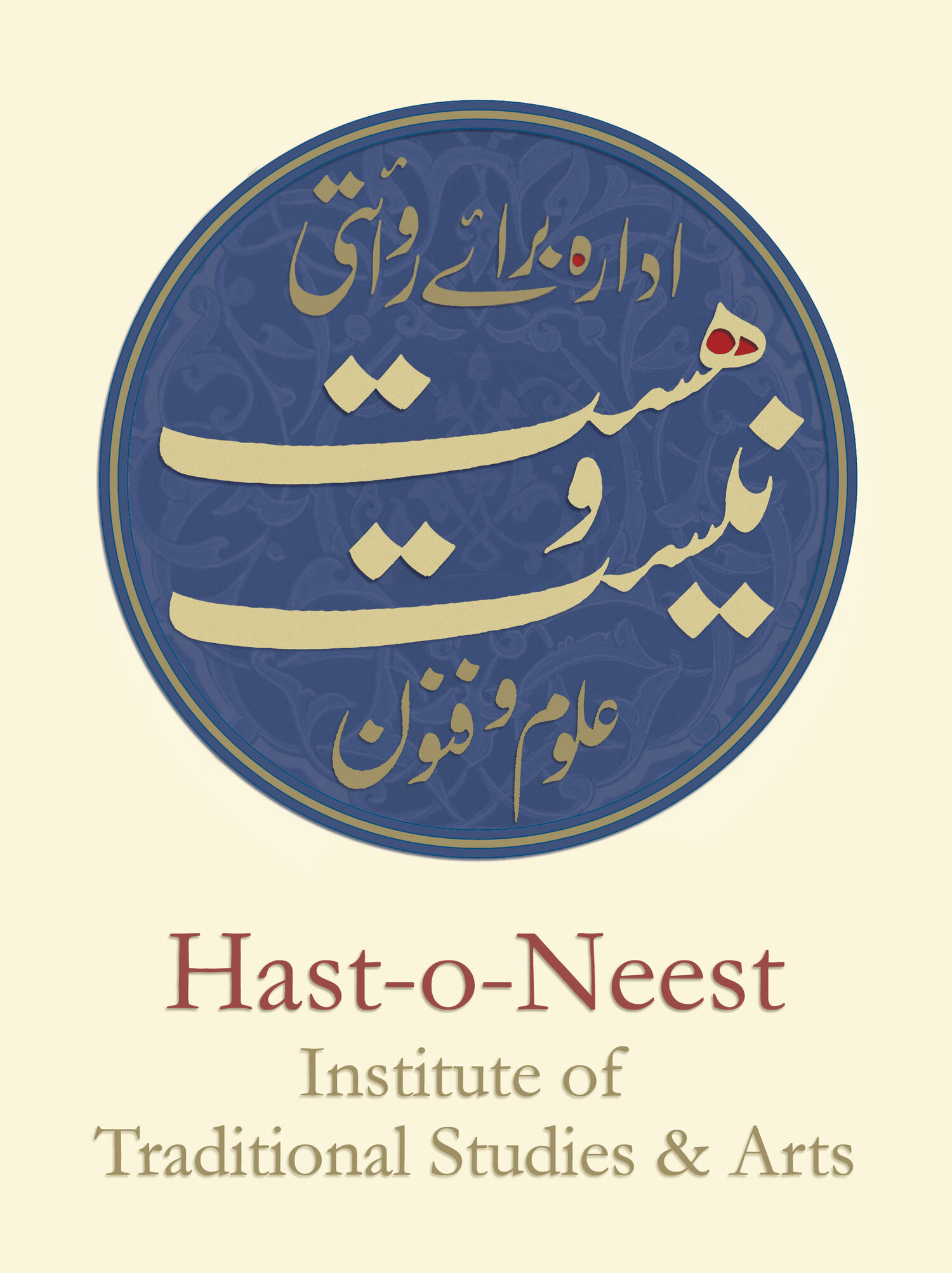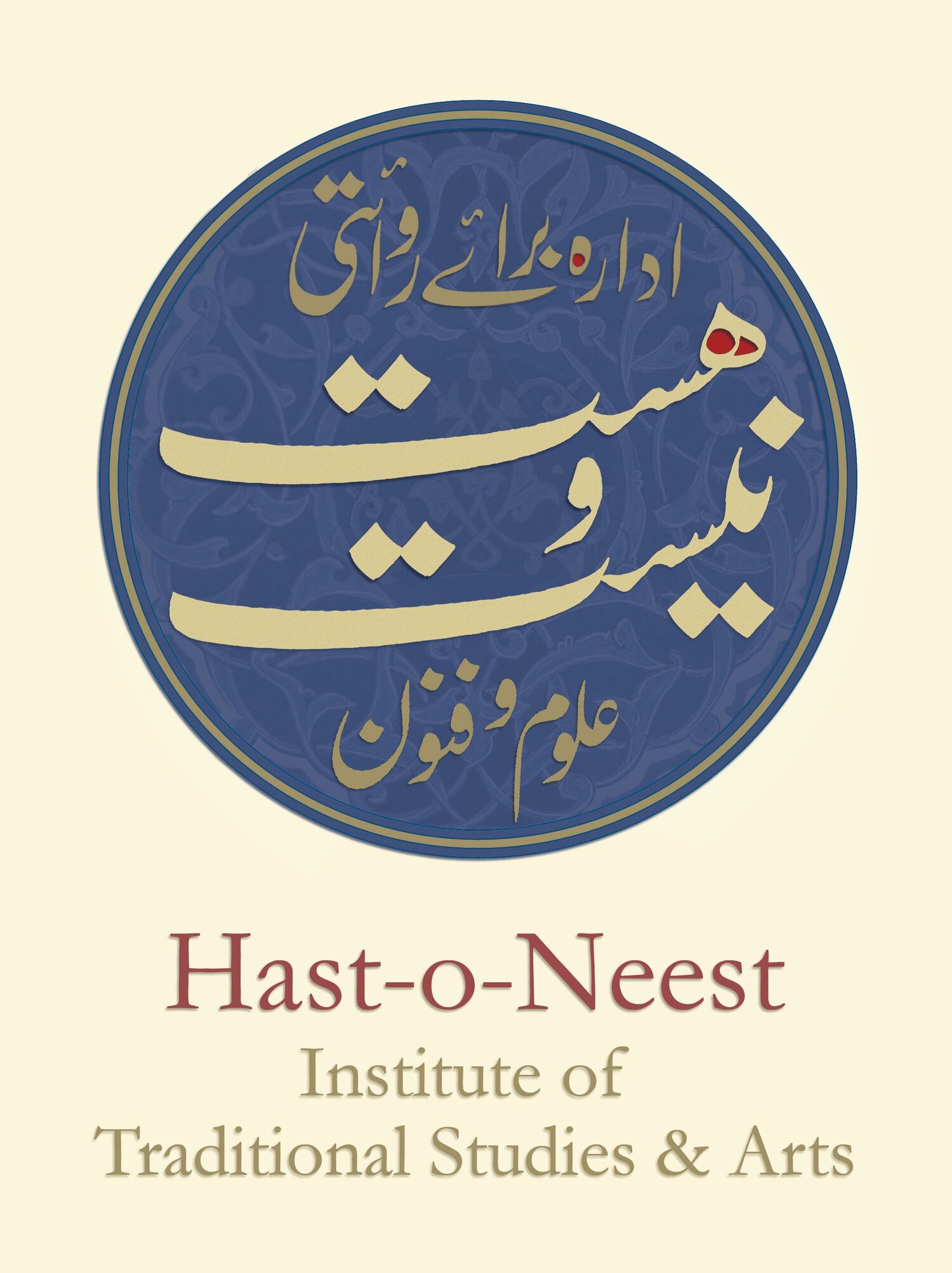
مطالعہ، مشق، حصول کمال
Centres of Knowledge at Hast o Neest
Hast-o-Neest’s objective is to create an environment of learning with teachers who can transmit traditional knowledge in its authentic form and spirit.
Course content is developed primarily by teachers, making each program a creative exercise which more often than not, leads to a continuous process of development for each course - as well as leading to further courses and study-circles - primary languages are Urdu & English.
Hast-o-Neest Institute of Traditional Studies & Arts is organized in five centres of knowledge - Arts, Architecture, Metaphysics & Philosophy, Languages, History & Cultural Studies - فنون - فن تعمیر- فلسفہ و عرفان - السنہ ء شرقیہ- تاریخ و ثقافت
Each centre carries out the Institute's aims and objectives - to engage, research and explore tradition - within its specified discipline; serving intellectual, literary, artistic traditions within the context of the modern world. In addition to study programs, we commemorate annual events as Rabi ul Awwal, Rajab, Ramzan ul Mubarak & Muharram ul Haram, and holds series of open sittings/study circles/guest lectures on various topics.
The location of these centres or collectives are in Lahore, Karachi, Islamabad and the USA. The Lahore & Karachi centers are locations of the Trust, whereas events in Islamabad and the USA are partnered with Hast o Neest members.
Courses/Programs of Study
Study Programs/Courses offered engage with tradition in the context of today’s world. This is achieved through access to relevant teachers, practitioners, scholars, and experts who are engaged through formal study programs, topic-specific lecture series, guest lectures and seminars - augmented by a small library, and over 200 recorded videos available online.
There are generally minimal requirements for application in order to encourage all those interested in the subject to step forward, and begin or resume their journey.
In addition, Hast-o-Neest is always open for informal meetings, discussions, and readings with the aim to encourage and support the search for knowledge, facilitating open discussion and dialogue.
Most courses are organized in levels that begin from zero knowledge, that is complete beginner, to advanced levels of thought and practice.
For the full list of study programs/courses offered at each centre, visit each centre’s homepage:
Structure & Application.
-
Format/Online & In-Person
Structure
Post-Pandemic (March 2020), most courses are a hybrid of online & in-person participation. If the Ustad is based outside-Lahore, then the course is Online only.
The ONLINE PLATFORM engaged is Zoom/Skype supported by Email/Google Drive/Whatsapp. Online participation, necessitates a computer, hands-free, stable internet connection, & a smart phone for a home-art studio.
TIME DIFFERENCES are worked out if applicants are from different time zones, and adjusted with the class students and teachers in mind. READING/REFERENCE MATERIAL are shared via Email/Google Drive/Whatsapp, or mailed by courier or post. SESSION RECORDINGS are made available to enrolled students as links, or as edited ‘Unlisted’ YouTube uploads. REMINDERS/INTIMATIONS relevant are shared via a whatsapp group.
-
Application
How to Apply
The study year is generally organized in 3 - 4 terms of 2 - 4 months each depending on the particular course.
TO APPLY FOR ANY PROGRAM/COURSE
Send in Course Title, Applicant Name, Academic Background, Email Address & Whatsapp number on hast.o.neest@gmail.com or on 03008493170 with a short paragraph on the reason for applying.
There is no government recognized degree awarded by the Institute. Certificate/Letter of Course Completion can be provided upon request.
-
Applicant Requirements
Time Requirements
Generally, the arts & languages courses necessitate daily practice post-class hours from students/the SHAGIRD; and history, philosophy and metaphysics courses require post-class hours hours of text engagement, i.e. reading, reflection etc .
In other words, students focus on engaging the teacher during sessions, & maintaining a daily-weekly post-class schedule for reading/reflection/note taking; and generally keeping a minimum dependency on session recordings, retaining recordings as a secondary, back-up support instead of as a substitute for direct teacher engagement.
-
Fee Guidelines
Term Fee Submission
The full term fee is preferred with provision of one initial sit-in session. Full term fee is to be paid by the 7th of the first month of each Term for all courses.
The details of payment by cash or crossed cheque in the name of the trust 'Baytunur'; or bank-to-bank electronic transfer (for within-Pakistan only) are shared with registered students only.
The fee submission is looked upon as a participation, a contribution or hadya towards the program.
Centres.
ابن مقلہ مرکز برائے فنون IBN MUQLA CENTRE OF THE ARTS
Abu Ali Muhammad ibn Ali ibn Muqla (circa 885 – 940), known as Ibn Muqla, was an official of the Abbasid Caliphate whose career culminated in his assumption of the vizierate at Baghdad thrice.
A famous calligrapher Ibn Muqla was the inventor of the renowned Thuluth style as well as five other styles of calligraphy. Revered as, 'A prophet in the field of handwriting, it was poured upon his hand, even as it was revealed to the bees to make their honey cells hexagonal' - Tabbaa, Yasser (1991). He is also considered the originator of "proportioned script" (al-khatt al-mansub), perfected by the 11th-century Persian calligrapher Ibn al-Bawwab - Sourdel, Dominique (1971).
Study programs focus on the philosophy, principles and practice of classical calligraphy, the arts of the book, including manuscript and Quranic illumination - tazhib. Other arts include classical music - vocal and instrumental - as well as a special program on Quranic Recitation.
Ustad Ahmad Lahori (Master Ahmad of Lahore), who died in 1059/1649, was one of the great architects of the seventeenth century. He may also have been the architect of the Taj Mahal. Though he referred to himself simply as Ahmad Mi'mar (Ahmad the architect), he was at once a skilled engineer and learned scholar in the sciences of astronomy, geometry and mathematics. Ultimately, he rose to become the chief architect of Shah Jahan, who awarded him the title of Nadir al-'Asr, or “Wonder of the Age,” in recognition of his artistic accomplishments.
Study and research programs focus on the philosophy, principles, and vocabulary of classical Islamic architecture in general and traditional architecture of Pakistan in particular with a view to contemporary application.
احمد معمار مرکز برائے فن تعمیر
AHMED MIMAR CENTRE OF ARCHITECTURE
ابن عربی مرکز برائے فلسفہ و عرفان
IBN ARABI CENTRE OF PHILOSOPHY & METAPHYSICS
Ibn ʿArabi, also known as Shaikh al-Akbar Muhyi al-Din Ibn al-Arabi(1165 – 1240), was an Andalusian Muslim scholar, mystic, poet, and philosopher. He was and still remains extremely influential within Islamic thought. His cosmological teachings became the dominant worldview in many parts of the Muslim world.
Study and research programs on traditional Islamic spirituality - Sufism / Tasawwuf - including Theoretical Sufism/Metaphysics, Sufi Poetry, Symbolism and Comparative Mysticism. Study and research programs on traditional Islamic philosophy, its major teachers and themes, as well as comparative philosophy.
Rishi Pānini, considered the ‘first descriptive linguist’, and even labelled as ‘the father of linguistics’, was a Sanskrit philologist, grammarian, and revered scholar in ancient India (between 6th and 4th century BC) who lived in Śalatura in ancient Gandhāra, present day north-west Pakistan.
Rishi Panini is known for his text Aṣṭādhyāyī, a sutra-style treatise on Sanskrit grammar, 3,959 verses or rules on linguistics, syntax and semantics in "eight chapters" which is the foundational text of the Vyākaraṇa branch of the Vedanga, the auxiliary scholarly disciplines of the Vedic period.
Study programs in Classical Arabic (Fusha), Classical Persian and Urdu Poetry & Poetics. We hope to expand the program to other languages of Pakistan.
پانینی مرکز برائے السنہ ء شرقیہ
PANINI CENTRE OF LANGUAGES
البیرونی مرکز برائے تاریخ و ثقافت
AL-BIRUNI CENTRE OF HISTORY & CULTURAL STUDIES
Abu Rayhan al-Biruni (973 – after 1050) was an Iranian scholar and polymath during the Islamic Golden Age. Al-Biruni was well versed in physics, mathematics, astronomy, and natural sciences, and also distinguished himself as a historian, chronologist and linguist.
A gifted linguist, he was conversant in Khwarezmian, Persian, Arabic, Sanskrit, and also knew Greek, Hebrew and Syriac. He spent much of his life in Ghazni, then capital of the Ghaznavids, in modern-day central-eastern Afghanistan. In 1017 he travelled to the Indian subcontinent and wrote a treatise on Indian culture entitled Tārīkh al-Hind (History of India), after exploring the Hindu faith practiced in India.
Study and research programs on History & Culture of Pakistan and the Region.






